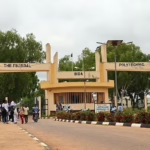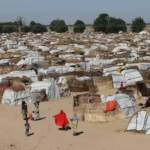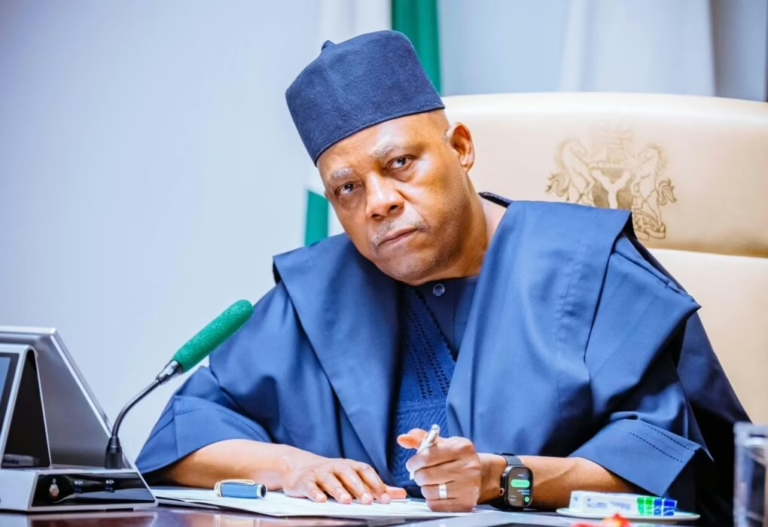Vice President Kashim Shettima emphasized that Nigeria’s continued dominance as Africa’s premier logistics center hinges on the comprehensive revival and modernization of its railway network.
He urged stakeholders to foster robust partnerships, collaborative efforts, and strategic networking, highlighting that capitalizing on the vast potential within the railway sector demands serious commitment and coordinated action.
Speaking in Abuja during the inauguration of the 2nd International Railway Conference, the Vice President attributed the current surge in railway initiatives to the visionary leadership of President Bola Ahmed Tinubu’s administration.
“Ladies and gentlemen, our foremost challenge is to secure Nigeria’s position as Africa’s logistics nucleus by rejuvenating our railway infrastructure. As the economic powerhouse of West Africa and the continent’s most populous nation, we must embrace cutting-edge railway technologies,” Shettima stated.
He pointed to transformative projects like the Kano-Maradi railway upgrade, which is set to unlock new trade corridors under the African Continental Free Trade Area framework, thereby enhancing regional commerce.
Highlighting the administration’s Renewed Hope Agenda, the Vice President underscored the urgent necessity to alleviate the excessive strain on Nigeria’s road networks, which have suffered from chronic congestion, accelerated wear, and elevated accident rates due to overdependence on road transport.
“Rail transport offers a safer, more cost-effective, and environmentally sustainable alternative, significantly lowering carbon footprints and reinforcing our dedication to green development,” he added.
However, Shettima acknowledged that unlocking the railway sector’s full potential is a complex endeavor requiring unwavering cooperation among all involved parties.
“Maximizing the opportunities within our railways is no simple feat. It demands strong alliances, strategic partnerships, and active engagement from all stakeholders,” he remarked.
He highlighted ongoing modernization efforts, including the Lagos-Kano, Kano-Maradi, and Port Harcourt-Maiduguri rail lines, emphasizing that these projects are structured to encourage private sector investment, ensuring not only their timely completion but also their long-term viability and efficient operation.
The Vice President reaffirmed the Tinubu administration’s commitment to creating an integrated transport network linking all Nigerian cities via rail and road, a move designed to accelerate industrial growth.
“President Tinubu has consistently demonstrated our nation’s resolve to connect urban centers through reliable transport infrastructure. Our vision is a Nigeria where industries can effortlessly move goods to markets, and raw materials flow seamlessly from producers to manufacturers,” he explained.
Opening the conference, Shettima described it as a critical forum for exchanging practical solutions to advance these goals and encouraged participants to leverage the expertise present to enhance the conference’s outcomes.
He commended the Federal Ministry of Transportation for organizing the event in partnership with De-Sadel Nigeria Limited and the Abuja Chamber of Commerce and Industry, praising their efforts to reconnect rail industry stakeholders across international borders.
Earlier, the Secretary to the Government of the Federation, Senator George Akume, lauded the High-Speed Rail (HSR) initiative as a bold, forward-thinking project that exemplifies the government’s dedication to transforming Nigeria’s public transportation landscape.
He emphasized that the Renewed Hope Agenda prioritizes infrastructure development, with the HSR project poised to drive inclusive economic growth and foster national unity.
Minister of Transportation, Senator Said Ahmed Alkali, the event’s chief host, highlighted transportation’s pivotal role in economic development and noted that the Renewed Hope Agenda has placed significant emphasis on the sector, resulting in the approval of major projects nationwide.
He referenced the Federal Executive Council’s recent endorsement of constructing state-of-the-art bus terminals across Nigeria’s six geopolitical zones, a development aimed at enhancing passenger safety and comfort.
Alkali further described the railway system as a unifying force with vast market potential, affirming the government’s readiness to lead efforts in accelerating public-private partnerships and attracting investments.
Minister of State for Petroleum Resources (Gas), Ekperikpe Ekpo, expressed optimism that the conference would catalyze railway advancements across Nigeria and the continent, opening new avenues for trade, investment, and industrial expansion.
He explained the synergy between the rail network and gas sector, noting that the administration’s efficient gas resource development ensures stable electricity supply along rail corridors, aligning with the Renewed Hope Agenda’s focus on sustainable energy and infrastructure.
Dr. Adebowale Adedokun, Director-General of Nigeria’s Bureau of Public Procurement (BPP), described the conference as a pivotal moment for the nation, emphasizing that prioritizing railways is essential for poverty alleviation and job creation.
He pledged the BPP’s full support for the Renewed Hope Agenda’s transportation goals, promising expedited approvals and stringent accountability measures to attract foreign direct investment.
The conference was attended by prominent figures including the Minister of Budget and Economic Planning, Atiku Bagudu; Minister of Steel Development, Prince Shuaibu Abubakar Audu; Chairman of the Senate Committee on Land Transport, Adamu Aliero; traditional rulers such as the Obi of Onitsha, His Majesty Nnaemeka A. Achebe, and the Ooni of Ife, His Imperial Majesty Adeyeye Enitan Ogunwusi; as well as industry leaders like Rowland Ocholi Ataguba, Managing Director of Bethlehem Rail.






















